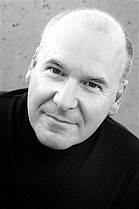STEPHEN CHATMAN
 One of Canada’s most prominent composers, Stephen Chatman (b. 1950), is professor of composition at The University of British Columbia in Vancouver. A multiple Juno nominee, he has received many composition awards, including the 2005, 2006 and 2010 Western Canadian Music Awards, “Classical Composition of the Year”, 2010 and 2012 SOCAN Jan V. Matejcek New Classical Music Awards and three B.M.I. Awards. In 2012 Dr. Chatman was appointed a Member of the Order of Canada.
One of Canada’s most prominent composers, Stephen Chatman (b. 1950), is professor of composition at The University of British Columbia in Vancouver. A multiple Juno nominee, he has received many composition awards, including the 2005, 2006 and 2010 Western Canadian Music Awards, “Classical Composition of the Year”, 2010 and 2012 SOCAN Jan V. Matejcek New Classical Music Awards and three B.M.I. Awards. In 2012 Dr. Chatman was appointed a Member of the Order of Canada.
CD recordings of Chatman’s work include three choral collections performed by Vancouver Chamber Choir, Due North, Due West and Due East. Other CD recordings include Magnificat, A Chatman Christmas, Vancouver Vision, Proud Music of the Storm, and Earth Songs. His works, published by E.C.Schirmer, Oxford University Press, Boosey and Hawkes, earthsongs, Frederick Harris, Dorn, and T. Presser, and have sold over 500,000 printed copies. please visit drstephenchatman.com
Joy, Joy - (mvt. 3 from the "Sorrow and Joy" trilogy)
by Stephen Chatman
SATB with piano – CP 2036 – duration 2:25
The 3rd movement of Chatman’s “Sorrow and Joy” trilogy explodes with exuberant happiness. Choirs will love the infectious syncopations.
our time to fly
joy, joy
hand in hand
running, rushing, running, rushing
over the dawn of our soul
let’s joy-ride in wider strides
our time to fly
joy, joy
let’s race down the road
wheels squealing
joy, joy
charge ahead, hand in hand
running, rushing, running, rushing
our time to fly
over the moon
Rejoice!
Let it be Forgotten
by Stephen Chatman
SATB a cappella – CP 1263 – duration 3:15
Sara Teasdale’s evocative poem is presented with great tenderness by Dr. Chatman. His quality writing is suitable for choirs from High School to University Ensembles
O Canada!
arr. Stephen Chatman
SATB with piano – CP 2182 (English)
SATB with piano – CP 2183 (French)
Canada is the 2nd largest country on earth. I takes nearly 10 hours to fly from Victoria, British Columbia, to St. John’s, Newfoundland. Canadians invented hockey – as we know it today! Likewise, Chatman’s setting of the national anthem is stately, majestic and approachable for any choir. Americans, you are welcome to sing along!
Sorrow and Joy (complete trilogy)
by Stephen Chatman
SATB a cappella – CP 2096 – duration 8:10
This trilogy has a beautiful shape, contemplating and exploring emotions that we all feel. the poetry is classic. Ending with exuberance, Joy, Joy, is syncopated and great fun. Each movement can be obtained individually. The trilogy is very convincing as a complete set.
Tears - (mvt. 2 from the "Sorrow and Joy" trilogy)
by Stephen Chatman
SATB with piano – CP 1959 – duration 1:55
Mourn that which will not come again,
The joy, the strength of early years.
Bow down thy head, and let thy tears
Water the grave where hope lies slain.
For tears are like a summer rain,
To murmur in a mourner’s ears,
To soften all the field of fears,
To moisten valleys parched with pain.
And though thy tears will not awake
What lies beneath of young or fair
And sleeps so sound it draws no breath,
Yet, watered thus, the sod may break
In flowers which sweeten all the air,
And fill with life the place of death.
Robert Fuller Murray
Welcome joy, and welcome sorrow - (mvt. 1 from the "Sorrow and Joy" trilogy)
by Stephen Chatman
SATB with piano – CP 1927 – duration 2:30
Dr. Chatman has always chosen quality poetry with great care and conviction. He has created a lovely marriage of music and text with this composition.
John Keats (1795-1821) loved the principle of beauty in all things. He expressed the idea in this poem of opposites, “Welcome joy, and welcome sorrow”. Keats implies that we can find joy in sorrow, beauty in ugliness, poverty in wealth, and so forth. Nothing can last forever. Joy and pleasure at this moment can be gone before we know it. We should welcome and embrace life in all its permutations.
Dancing music, music sad,
Both together, sane and mad;
Oh! The sweetness of the pain!
Laugh and sigh, and laugh again,
Welcome joy, and welcome sorrow,
Come to-day, and come to-morrow,
I do love you both together!
John Keats (1795-1821)

